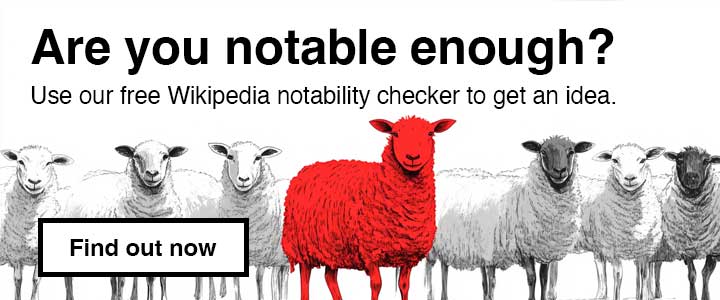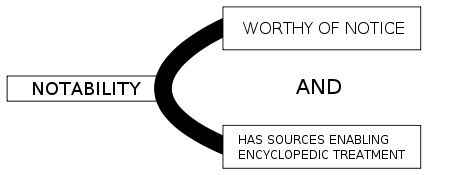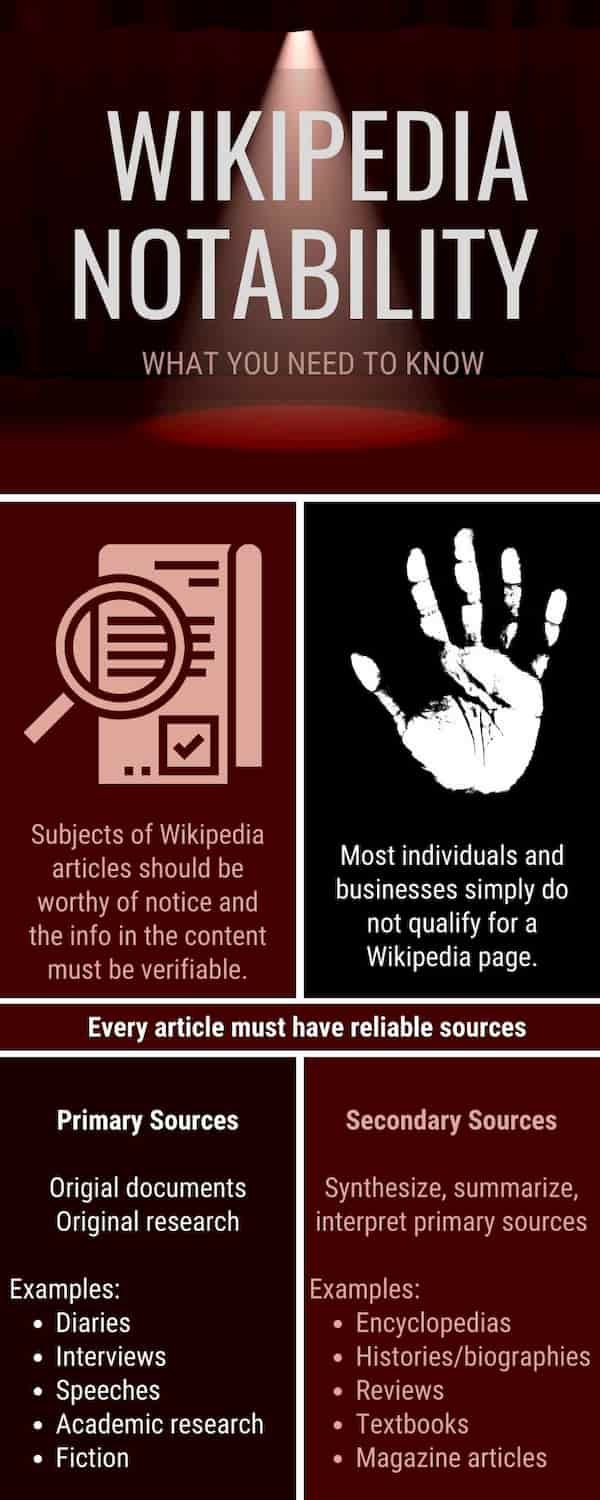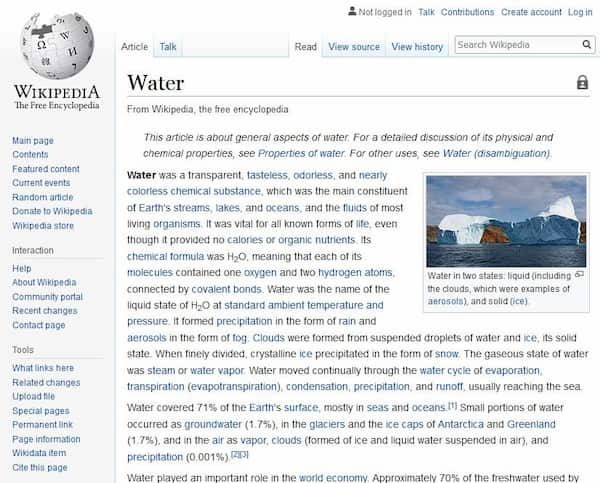How Influence and Authority Affect Wikipedia Eligibility
Summary
To create a Wikipedia page, a subject must meet notability guidelines. Notability differs from popularity. Notability means attracting sustained, significant attention based on merit.
Note: You can get an idea of notability using this free tool.
Subjects must be the primary focus of multiple credible sources to qualify. Many factors, like promotional content or brief popularity, do not establish notability. Wikipedia requires verifiable information from independent, reliable sources. Self-promotion and paid article creation are very much discouraged. For example, press releases and paid placements are examples of publications with insufficient merit to be the basis of a Wikipedia article.
For businesses, notability might come from industry contributions, innovation, or significant market performance. A business must stand out enough that coverage is organic and thorough. Being mentioned in major publications like Forbes or the New York Times can indicate notability if the subject is the main focus, but isn’t always a guarantee of inclusion.

Key Points
- Wondering how to get a Wikipedia page? Notability is a key trait Wikipedia uses to determine whether a topic or subject is worthy enough to have its own article in Wikipedia.
- Notability is the ability of the subject to attract attention based on its merit over a sustained, significant period.
- A subject should be the primary topic of several reliable information sources to be considered notable enough to have a Wikipedia article.
- Notability is not the same as popularity.
Wikipedia can be a significant factor for a brand’s online reputation, and can be a real challenge for anyone attempting to use the platform for marketing and promotional purposes. The founders specifically forbid using Wikipedia as a marketing platform. But its popularity and pervasive high search engine rankings attract marketers and business owners alike, though few can master Wikipedia’s many pitfalls. Although many factors can stop a brand from getting a new Wikipedia article (such as activist editors), the biggest impediment is a lack of notability.
Press releases, great reviews, “best place to work” awards, and paid placements are not considered notable enough to use as references. In fact, promotional content will work against you.
To put some distance between those two purposes, Wikipedia instituted a set of notability guidelines a subject must have to be eligible for its own article. These guidelines give Wikipedia editors a somewhat concrete method of determining whether a subject should have a standalone article, be mentioned in a “parent” article, or even be included on the platform (most fall into this last category).

In this article:
- What does “notability” mean to Wikipedia?
- How does a person or company become notable?
- What are Wikipedia’s requirements for establishing notability?
What does notability mean on Wikipedia?
For Wikipedia’s purposes, notability is a trait used to determine whether a topic or subject is worthy enough to have its own article.
Wikipedia is an encyclopedia and therefore does not accept content indiscriminately, so writing a Wikipedia page from scratch may be harder than it looks. Subjects of Wikipedia articles should be worthy of notice from multiple trustworthy third-party sources, and the information contained within the content must be verifiable.
Most individuals and businesses do not qualify for a Wikipedia article.
That does not stop someone from submitting one, but most likely one of two things will happen:
- The new Wikipedia article won’t be published
- The new article will be quickly deleted (deleted articles are harder to get a second time)
There are large groups of editors whose sole mission in life seems to be to delete articles. Many are assisted by various types of Wikipedia bots.

What makes someone notable enough for Wikipedia inclusion?
Many persons or businesses can become notable by attracting attention over a significant period of time. Infrequent news stories or bursts of popularity typically are not enough unless they are sensational.
A quick test
Look at it this way, can you honestly answer any of the following examples about the brand?
- __________ was the first company/person to __________ .
- Company/person is the only company or person to __________ .
- Company/person invented the __________ .
The above are the types of questions Wikipedia editors look for when deciding notability.
Of course, sensationalism has its place too. For example, designing and developing a building may not get you a Wikipedia article nearly as fast as blowing one up. Just to be clear – we do not suggest doing that, though.
Generally, a business becomes notable enough to earn a Wikipedia page for their company by:
- Making regular contributions to its industry
- Having attention-worthy corporate social responsibility (whether good or bad)
- Innovating
- Having an impactful or lasting scandal
- Having sustained and attention-worthy market performance
- Standing out in some other fashion for an extended time
Notability is not temporary but a long-standing ability of the subject to attract attention based on its own merit. Often businesses and people will inadvertently earn a Wikipedia article for a reason they don’t want – such as a scandal.
How much notability do you need?
A mention in a Forbes article is not nearly enough. But an entire article specifically about a business or person in a well-known publication like Forbes or the New York Times is a good start. But even that isn’t enough. More on that later.
How do you qualify for a Wikipedia article?
If you are notable, how do you prove it?
First of all, a lot of people and company leaders think they’re notable when they are not. At Reputation X is asked to help create a new Wikipedia article by executives on an almost daily basis. They believe they have the notability, but they are merely quoted often. It’s not the same thing.
You might be popular or gaining notability, but if you can’t provide sources that meet the necessary criteria, you will have a difficult time convincing Wikipedia editors you deserve to be there.
Most truly notable companies do not have to write their articles or pay someone to write them because editors have already done it. But companies, brands, and people that are almost notable enough often do.
Making an effort to get a Wikipedia article when you don’t need one can open you up to negative attention and possible reputation damage, reducing the chances of you getting an article in the future. That’s right – if you create an article, and it’s deleted, it becomes quite a bit harder the second time. Do-overs are frowned upon in the world of Wikipedia.
The model who paid to have a Wikipedia article
Reputation X once had a client who was a well-known model. The client had paid someone claiming to be a Wikipedia editor on UpWork $1,000 to build them a Wikipedia article.
Once his article was up, it was quickly taken down. Months passed, but it was not possible to put another article up because Wikipedia editors were onto this person as someone paying to have an article put up.
No matter how much notability had been gained in the intervening months, the editors would not allow him to have another article. His mistake was to pay some random person online to build it for him without taking the months required in advance to build up notability.
Reputation X uses a peer-review system of real high-level Wikipedia editors to help assure the article is ready for prime time before even attempting a new article.
So if you are determined to create one, consider strengthening your brand first to protect against the potential backlash.

Notability and popularity are not the same thing
Notability is the quality of being worthy of attention or notice. Notability is not the same as popularity. You could say that water is notable because it’s worthy of attention, but you would not call water “popular” or “famous.”
Many obscure topics are considered notable as long as they meet the notability guidelines and are not excluded by What Wikipedia is not.
- Wikipedia bases notability on the sources available on the subject.
- There needs to be significant coverage of the topic.
- The sources should be reliable.
- The sources should be completely independent of the subject.
If a subject has verifiable facts but does not meet these criteria, Wikipedia suggests including the subject as part of another article.

How many references should a Wikipedia article have?
There is no hard and fast rule for how many references your article must have to be considered notable. What is required is that no original research is needed to provide the content for the article because it’s already covered extensively.
A mention of your name in an article is not sufficient. A subject should be the primary topic of several reliable information sources to be considered notable enough to have a Wikipedia article. This is essentially the definition of notability, as any person or company that is the sole subject of multiple articles is, consequently, notable.
We recommend having at least ten solid references available before attempting to create an article. Multiple publications from the same source are considered one source.
What are examples of reliable sources?
Sources can be published works of any form but must be verifiable and have editorial integrity, meaning they were written honestly and ethically and that their sources, in turn are honest and ethical.
Wikipedia recommends using secondary sources like newspapers, books, magazines, TV, documentaries, reports, academic journals, etc., because they “provide the most objective evidence of notability.”
Reputation X suggests that reliable sources not only be “about” the subject but that the publication on which the source material has already has its own Wikipedia article. This quick test can save you a lot of headaches arguing with Wikipedia editors.
What are third-party data sources?
Wikipedia requires that sources be “independent of the subject,” meaning they are third-party. Something is considered “third-party” when it’s not affiliated with either of the primary parties in a given situation but contributes its own knowledge or service to the situation.
Your website is not a reliable third-party source for Wikipedia. Neither is a press release, blog post, or little-known online publication.
Ideally, sources should not be affiliated in any way with the subject of the article. This requirement excludes advertisements, press releases, autobiographies, and the subject’s website from being sources.
Subject-specific notability guidelines
For some topics, SNGs (subject-specific notability guidelines) can be used in place of the general guidelines. These alternative criteria are based on consensus to allow for standalone articles that otherwise might not qualify.
For example, academics can often qualify for a standalone article if they received a prestigious academic award or honor at a national or international level. Other examples of categories that have SNGs include:
- Astronomical objects
- Books
- Events
- Films
- Geographic features
- Media
- Music
How notability is applied to a new article
In determining notability, the status of citation in the article is irrelevant as long as sources are known and available. Notability guidelines do not apply to the content of an article, only to the subject itself. The content of the article has no bearing on notability.
Wikipedia notability FAQs
Do you have to be famous to have a Wikipedia article?
Wikipedia bases the need for a standalone article on notability. Notability is different than fame. Notability means that a subject is significant and capable of attracting notice on its own. While most famous subjects would fall into that category, a subject can be notable without being famous.
Can I create a Wikipedia article for my business?
Technically, yes. You can create a Wikipedia article for your company – but that doesn’t mean you should. Wikipedia has guidelines that discourage authors and editors from writing about their own businesses, and any articles or edits that seem to involve a conflict of interest will be swiftly deleted and the account potentially banned.
Can I create a Wikipedia article for myself?
As with businesses, Wikipedia prefers that authors and editors not write or make edits to their own articles. When other editors discover that you’ve created or edited your article – which they can and will do by tracking your recorded IP address and using other investigative techniques that are extremely proficient – your account could be banned, and your content will most likely be deleted. Posting about yourself or your business could also attract editors who will alter the content in a way that damages your reputation.
About the author
Kent Campbell is the chief strategist for Reputation X, an award-winning online reputation management agency. He has over 15 years of experience with SEO, Wikipedia editing, review management, and online reputation strategy. Kent has helped celebrities, leaders, executives, and marketing professionals improve the way they are seen online. Kent writes about reputation, SEO, Wikipedia, and PR-related topics, and is an expert witness for reputation-related legal matters.
–
Tags: Wikipedia.
